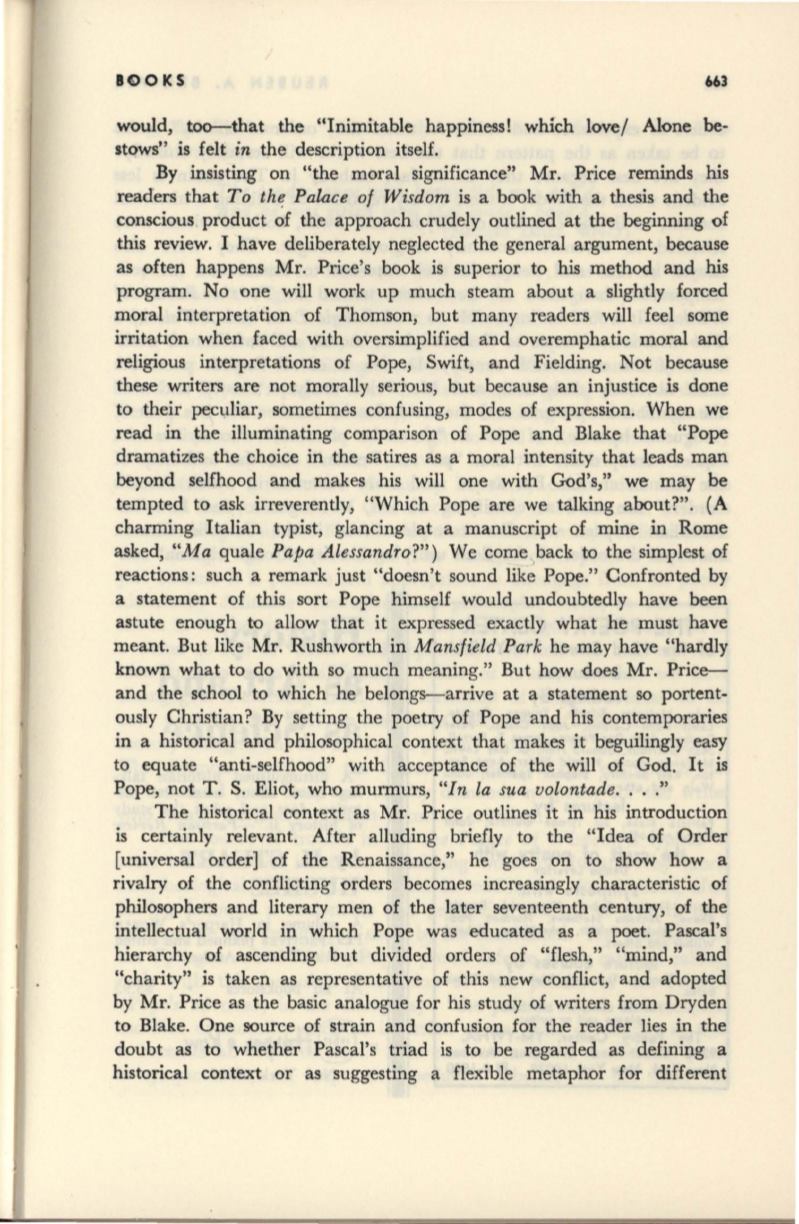

BOOKS
663
would, too-that the "Inimitable happiness! which love/ Alone be–
stows" is felt
in
the description itself.
By insisting on "the moral significance" Mr. Price reminds his
readers that
To thf! Palace of Wisdom
is a book with a thesis and the
conscious product of the approach crudely outlined at the beginning of
this review. I have deliberately neglected the general argument, because
as often happens Mr. Price's book is superior to
his
method and his
program. No one will work up much steam about a slightly forced
moral interpretation of Thomson, but many readers will feel some
irritation when faced with oversimplified and overemphatic moral and
religious interpretations of Pope, Swift, and Fielding. Not because
these writers are not morally serious, but because an injustice is done
to their peculiar, sometimes confusing, modes of expression. When we
read in the illuminating comparison of Pope and Blake that "Pope
dramatizes the choice in the satires as a moral intensity that leads man
beyond selfhood and makes his will one with God's," we may be
tempted to ask irreverently, "Which Pope are we talking about?". (A
charming Italian typist, glancing at a manuscript of mine in Rome
asked,
"Ma
quale
Papa Alessandro?")
We come back
to
the simplest of
reactions: such a remark just "doesn't sound like Pope." Confronted by
a statement of this sort Pope himself would undoubtedly have been
astute enough to allow that it expressed exactly what he must have
meant. But like Mr. Rushworth in
Mansfield Park
he may have "hardly
known what to do with so much meaning." But how does Mr. Price-–
and the school to which he belongs--arrive at a statement so portent–
ously Christian? By setting the poetry of Pope and his contemporaries
in a historical and philosophical context that makes it beguilingly easy
to equate "anti-selfhood" with acceptance of the will of God. It is
Pope, not T. S. Eliot, who murmurs,
"In La sua volontade.
..."
The historical context as Mr. Price outlines it in his introduction
is certainly relevant. After alluding briefly to the "Idea of Order
[universal order] of the Renaissance," he goes on to show how a
rivalry of the conflicting orders becomes increasingly characteristic of
philosophers and literary men of the later seventeenth century, of the
intellectual world in which Pope was educated as a poet. Pascal's
hierarchy of ascending but divided orders of "flesh," "mind," and
"charity" is taken as representative of this new conflict, and adopted
by Mr. Price as the basic analogue for his study of writers from Dryden
to Blake. One source of strain and confusion for the reader lies in the
doubt as to whether Pascal's triad is to be regarded as defining a
historical context or as suggesting a flexible metaphor for different









